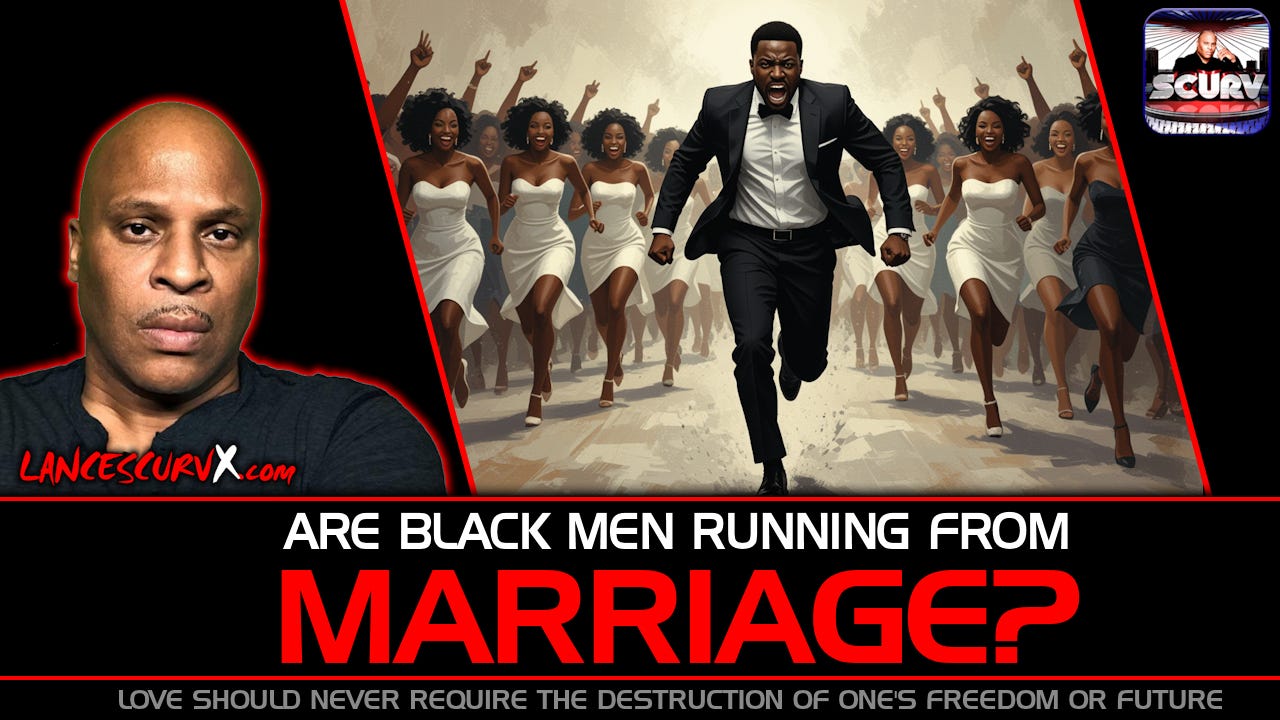ARE BLACK MEN RUNNING FROM MARRIAGE?
Marriage was once spoken of as the highest sign of maturity. It was painted as the doorway to stability, respect, and a life built on solid ground. Young men were told it would make them “real men,” able to lead families, shape futures, and find lasting peace. This vision was repeated so often that many accepted it without question.
But for a growing number, that picture has begun to fade. Instead of feeling stronger, many men step into marriage and find themselves anxious, drained, or even broken after painful separation. The phrase “till death do us part” no longer carries the weight it once did. The truth is that for many, the words ring hollow, replaced by quiet exits, fractured dreams, and numbers that paint a sobering reality.
More than half of men under 35 now say they have no plans for marriage. That number has tripled since 1990. It is not because men want to avoid responsibility. It is not because they want to hide in their parents’ homes, glued to screens and video games. Something deeper is at play. The very foundation of marriage — the contract, the institution, the promise — has changed in ways many no longer find worth the risk.
This change is not small. It is not a minor adjustment in culture. It is a transformation of one of the oldest institutions in our community. At the heart of it lies a hard truth: love remains powerful, but marriage itself has become a gamble where the stakes are far too high, and the consequences can strip away everything a man has worked for.
For the Black community, this shift cuts even deeper. The weight of history, the scars of broken homes, and the trauma of separation echo loudly. To understand why so many are walking away, we must look closely at the forces pushing them out — financial, emotional, spiritual, cultural, and generational.
The Financial Trap
The first and most obvious reason is money. Marriage is no longer seen as a simple partnership. It is a legal and financial contract that, if broken, can leave one side in ruins. The average contested divorce costs more than $15,000 in legal fees alone. That does not include splitting property, dividing assets, or paying child support.
For a man who has spent years building a business or saving toward a dream, one decision by a court can wipe away decades of work. What once felt like a partnership now feels like a financial trap. Even prenuptial agreements, meant to offer protection, can be thrown out by judges who decide they are “unfair.” In practice, there is no guaranteed shield.
When the financial system itself feels stacked against men, walking away from marriage stops looking like selfishness and starts looking like survival. It becomes a matter of risk management. Why gamble with everything when the odds lean so heavily toward loss?
Freedom and Autonomy
Beyond money lies another force: freedom. Many men still desire companionship, intimacy, and shared life. But marriage, as it is structured today, often places a heavy layer of joint decision-making on every choice, big and small.
From where to live, to how holidays are spent, to daily routines and even leisure time — marriage introduces constant negotiation. For many, this slowly erodes the sense of self. Studies show that within just 18 months of marriage, men report a significant drop in their sense of independence.
This loss of autonomy is not about selfishness. It is about the human need for agency — the ability to make choices without always needing approval or compromise. When freedom feels shackled, resentment grows. Many ask: why sign away independence for a coin toss between harmony and lifelong frustration?
Respect and Intimacy
Respect is another cornerstone of a healthy relationship. Without it, love struggles to survive. Yet many men speak of marriages where intimacy fades and respect crumbles.
Research shows sexual frequency drops sharply within the first years of marriage and often continues to decline. But the deeper wound is not physical — it is emotional. When men feel like providers and laborers whose voices and needs come last, the relationship begins to feel like a job without pay, without recognition, and without fulfillment.
Respect and intimacy are not luxuries. They are the soil in which love grows. Without them, marriage becomes a burden. Walking away, in such cases, is not a rejection of love but a demand for dignity.
Generational Trauma
Many men carry memories not of happy marriages but of painful separations. They grew up watching fathers leave with trash bags of clothes, shuttling between households, or witnessing tense courtroom battles.
The trauma of divorce leaves lasting marks. Studies show children of divorced parents are twice as likely to avoid marriage themselves. For many, the memory of conflict, custody battles, and financial strain is enough to make them vow never to repeat the cycle.
This is especially heavy in the Black community, where broken homes and absent fathers have already left deep scars. To many, marriage does not represent hope — it represents risk. Choosing to remain single becomes a way of breaking the cycle and protecting future children from the pain they once endured.
The Myth of the Ideal Marriage
It is important to say this: not every marriage fails. There are still couples who last 50 years, holding hands and inspiring others with their bond. Their love is beautiful and real. But these stories are increasingly the exception, not the rule.
Statistics tell us the opposite story — of separations, struggles, and risks that outweigh the rewards. The dream of lifelong unity remains alive, but the system built around it does not reflect fairness or stability. Until marriage itself evolves to protect both sides equally, the risks will continue to drive men away.
The Weight of False Standards
Another force shaping this crisis is the illusion of the “perfect partner.” Movies, media, and dating apps all feed the idea of endless choice. A soulmate may feel just one swipe away. Standards become inflated, and the imperfect but real partner before you begins to feel like a compromise.
This endless search creates exhaustion. Many feel trapped in an audition for a role that may not even exist. In such a climate, the thought of making a lifelong vow feels overwhelming, even reckless.
The Mental Load
Marriage often carries an invisible weight: the mental load. This is the constant planning, organizing, and remembering that keeps a household running. Men may share in physical chores, but the expectation of anticipating needs — from meals to appointments to family plans — becomes another source of strain.
Over time, this imbalance leaves men feeling managed rather than partnered. What begins as teamwork turns into silent pressure, with failures magnified and efforts overlooked. For some, the easiest way to escape this imbalance is never to enter it.
Single Life and New Possibilities
Modern single life is not what it was in past generations. Today, technology, social clubs, delivery services, and endless options for connection mean one can live comfortably without marriage.
Studies show single men often have more financial freedom, lower stress, and greater control over their health and time. The benefits once tied to marriage — meals, companionship, social respect — are now available without legal or emotional risk. For many, the trade-off is simple: freedom and stability outweigh the promise of marriage.
Outdated Laws
Family law remains stuck in the past. Systems built decades ago still assume traditional gender roles, often placing men at a disadvantage. From alimony to custody to property division, the scales are rarely balanced.
Even allegations without proof can remove a man from his home, stripping away security and reputation. In such an environment, entering marriage feels like stepping into a system already stacked against you. Until laws reflect fairness, the institution will remain fragile.
Identity and Self-Preservation
Marriage also reshapes identity. A man who has worked to build independence, passions, and purpose may feel those things swallowed in the role of “husband.” The merging of two lives, while beautiful in theory, can sometimes mean the erasure of self.
Protecting one’s identity is not selfish. It is survival. For many, avoiding marriage is less about fear of commitment and more about refusing to lose the self they have fought to build.
Love remains powerful. The desire for connection, partnership, and family has not died. What has changed is the trust in marriage as the pathway to those things.
For many men in the Black community, the risks of marriage — financial, emotional, legal, and generational — outweigh the rewards. Choosing not to marry is not a rejection of love. It is an act of self-preservation in a system that feels one-sided and outdated.
This does not mean lasting love is impossible. It means the institution itself must change. It must offer fairness, respect, and protection to both sides if it hopes to regain trust. Until then, more will walk away, not from love, but from a contract that no longer serves their survival.
To those who remain in strong marriages: honor them, nurture them, and let them be examples of balance and respect. To those still deciding: weigh the risks, know your worth, and choose with open eyes. And to those who walk away: understand that survival is not weakness — it is wisdom.
The Black community has endured too much loss to blindly step into traps disguised as traditions. The future demands new models of love, unity, and respect. Only then can partnership truly thrive again.




